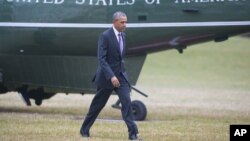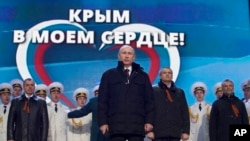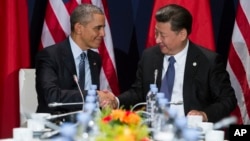With less than a year left in his White House tenure, U.S. President Barack Obama says he has reached an overriding conclusion that the United States can be a force for good in world affairs, but by no means can it or should it try to control every uprising that does not threaten its national security.
In a wide-ranging discourse about his foreign policies during his seven-plus years in office, Obama acknowledged to The Atlantic magazine that he is "controversial" when it comes to the use of American military power, even though he has launched thousands of airstrikes and drone attacks in the Middle East against Islamic State jihadists and provided military support leading to the overthrow of Libyan strongman Moammar Gadhafi.
"There's a playbook in Washington that presidents are supposed to follow," he told the magazine's correspondent, Jeffrey Goldberg. "It's a playbook that comes out of the foreign policy establishment. And the playbook prescribes responses to different events, and these responses tend to be militarized responses. Where America is directly threatened, the playbook works. But the playbook can also be a trap that can lead to bad decisions."
Reluctance on Assad
In one defining foreign affairs moment of his presidency, Obama backed off from an imminent 2013 attack against the regime of Syrian President Bashar al-Assad when Western experts discovered he had amassed chemical weapons and believed he was ordering their use against rebel groups fighting government forces.
But Obama said he concluded "that while we could inflict some damage on Assad, we could not, through a missile strike, eliminate the chemical weapons themselves, and what I would then face was the prospect of Assad having survived the strike and claiming he had successfully defied the United States, that the United States had acted unlawfully in the absence of a U.N. mandate."
Realistic on Russia
Similarly, Obama said he adopted a realistic stance to Russia's 2014 takeover and annexation of Ukraine's Crimean peninsula.
"This is an example of where we have to be very clear about what our core interests are and what we are willing to go to war for," he said. "And at the end of the day, there's going to be some ambiguity."
Obama said Russian President Vladimir Putin "acted in Ukraine in response to a client state that was about to slip out of his grasp. And he improvised in a way to hang on to his control there. He's done the exact same thing in Syria (in launching airstrikes to support Assad's forces), at enormous cost to the well-being of his own country.
"And the notion that somehow Russia is in a stronger position now, in Syria or in Ukraine," Obama said, "than they were before they invaded Ukraine or before he had to deploy military forces to Syria is to fundamentally misunderstand the nature of power in foreign affairs or in the world generally."
Comments draw silence, criticism
Saudi Arabia drew Obama’s criticism on a couple of fronts. The president faulted Riyadh for funding Wahhabi madrassas that promote a strict Islamic fundamentalism and for its resistance to effectively “share the neighborhood” with rival Iran, beneficiary of a new nuclear deal negotiated by the United States and other global leaders.
A spokesman with the Saudi Embassy in Washington, D.C., asked by Foreign Policy to comment on the remarks, tersely said, "No."
By publicly airing such views, Obama will "inflict further damage" on some already-frayed American alliances, said an op-ed for Israel Hayom written by Elliott Abrams. Now a senior fellow for Middle East studies at the Council on Foreign Relations, Abrams supervised U.S. policy in the region for the George W. Bush administration.
"American alliances are not in good shape these days, with many countries worrying that President Barack Obama does not value the alliances, their own role in those alliances, or the commitments our alliances imply to the safety of states that are to some degree dependent on the United States,” Abrams wrote.
Political surveys in the United States have generally shown Obama's views on the limited use of American force overseas are aligned with those of a U.S. public that is wary of more military intervention after years of war in Afghanistan and Iraq. But Republican presidential candidates looking to succeed him when he leaves office next January have denounced his views, saying he has left the United States a weakened power.
Putting stock in China
Obama said that in the coming decades the U.S. relationship with China "is going to be the most critical."
He said that "if we get that right and China continues on a peaceful rise, then we have a partner that is growing in capability and sharing with us the burdens and responsibilities of maintaining an international order."
But Obama added, "If China fails; if it is not able to maintain a trajectory that satisfies its population and has to resort to nationalism as an organizing principle; if it feels so overwhelmed that it never takes on the responsibilities of a country its size in maintaining the international order; if it views the world only in terms of regional spheres of influence - then not only do we see the potential for conflict with China, but we will find ourselves having more difficulty dealing with these other challenges that are going to come."







